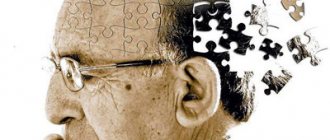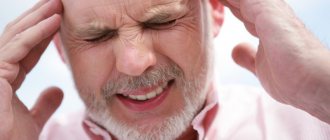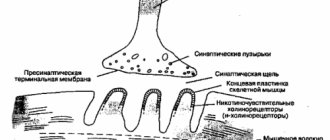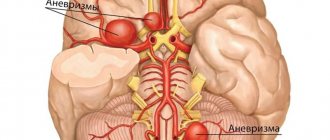Normal or disease?
What is menopausal neurosis? In essence, this is the same conflict between what is desired and what is real, which is the cause of all types of neuroses. Only in this case it is aimed at a woman’s self-perception as a representative of her gender.
During menopause, you have to admit that old age does not happen to someone else, but is just around the corner and will soon knock on the door. Some roles that a woman is used to playing become complex - a conqueror of hearts, a lover for her beloved husband. A conflict arises between the desire to stop time and the manifestations of the approaching menopause hidden from oneself. It can cause numerous mental and autonomic symptoms.
In addition, during menopause, a woman experiences surges in hormones, and against the backdrop of mood instability, irritability and tearfulness, it is much more difficult to accept the new realities of life and an unusually working body, which suddenly began to “fail” at the most crucial moments.
Women are ashamed of hot flashes and sweating, angry with themselves for being irritable, but any doctor will say: everything that happens to you is absolutely normal and natural, just as all changes in a woman’s body are natural - in adolescence, during pregnancy and breastfeeding, during premenstrual syndrome and menstruation.
General symptoms of menopause and VSD
Vascular disorders caused by autonomic dysfunction have many similarities with menopausal symptoms. VSD in premenopausal women may have the following manifestations:
- The woman begins to get tired quickly and often feels a general malaise.
- Panic attacks, attacks of fear and fears for health occur.
- An unpleasant bitter taste is felt in the mouth.
- Periodically, heart pain occurs with tachycardia and nausea, and sometimes even with vomiting.
- Often there is a paroxysmal headache, similar to a migraine.
- VSD during menopause can manifest itself as frequent urination. In this case, pathologies of the excretory organs are not detected.
- Libido disappears.
Increased nervousness and anxiety, panic attacks and cardiac dysfunction increase during the perimenopause period and are especially pronounced during menopause.
There are factors that aggravate the manifestations of dystonia during menopause. These include excessive consumption of fats and sugar, a sedentary lifestyle, smoking, and frequent stress.
Classic signs of menopause
For most women, symptoms of menopause include:
- fatigue;
- sweating;
- hot flashes with redness of the skin;
- difficulty falling asleep;
- sudden awakening and inability to fall asleep again;
- irritability, tearfulness;
- suspiciousness;
- pressure surges;
- tachycardia;
- heart pain without organic causes;
- rapid mood changes;
- noise in ears;
- constipation, flatulence;
- itching in the genitals;
- pain when urinating;
- “floaters” in the eyes;
- dizziness.
All of them are associated with changes in hormonal levels, surges in estrogen and progesterone, and the body’s adjustment to the new “hormonal reality.” In the future, when the menopause passes and menopause occurs, these symptoms will disappear. And their place will be taken by gradually developing changes in posture and skin elasticity, gray hair and wrinkles, and weight gain. Sometimes increased bone fragility and mastopathy develop; Also, menopause can become an impetus for the onset of diseases of the cardiovascular system.
The listed signs of aging develop in different women at different rates and volumes. Much depends on heredity, amount of movement, quality of food, the presence of bad habits and, most importantly, on the way of thinking. It is known that cheerful and kind people age more slowly, and even in old age remain active and full of energy.
Treatment of neurosis with really helpful folk remedies at home
From a psychological point of view, the cause of neurosis is an internal conflict of the individual as a result of the fact that a person’s needs are not commensurate with his capabilities.
A weak nervous system reacts sharply to such stressful situations, is susceptible to the opinions of others and reacts negatively to situations that seem insoluble. This leads to the emergence of chronic mental disorders.
Other factors that influence changes in consciousness include:
- Frequent overwork
- Lack of sleep
- Emotional fatigue
- Exposure to radiation
- Unfavorable environmental conditions
- Severe debilitating illnesses
- Features of the nervous system that distort the perception of problem situations
- Improper upbringing, excessive pressure from parents in childhood
- Aggression from the outside
- Increased demands on yourself
- Unstable relationships with others
- Psychological trauma
There is a predisposition factor when the characteristics of neurophysiological and neurotransmitter systems influence the appearance of neuroses. Often this is a kind of protective reaction of the body to unpleasant or problematic situations in life.
How to treat neurasthenia under the supervision of a specialist
Any mental disorder is best treated according to the instructions of a psychotherapist. He studies the specifics of a particular case and selects therapy for each patient. Mainly used:
- Psychotherapeutic methods to identify the root cause of neurasthenia and see the best ways to combat it.
- Physiotherapy, among which the most widespread methods are:
- acupuncture;
- taking medicinal baths.
Patients are often advised to exclude coffee and alcohol from their menu, instead saturating their diet with healthier chamomile, mint, and lemon balm teas, which have a calming effect. It is also critically important to change your daily routine: a person should not overwork and do a lot of things he doesn’t like.
Usually this is enough for the neurasthenia to begin to recede. But in severe cases, psychotherapists are forced to prescribe medications to patients:
- nootropics (Aminalon);
- antioxidants (Mexidol);
- tranquilizers (Atarax);
- homeopathic medicines;
- sedatives.
The use of medications does not eliminate neurosis, but only weakens the symptoms. Medicines are prescribed so that a person can come to his senses and gain strength for further therapy.
Even if medications are prescribed, it is extremely rare that a patient is recommended to go to hospital. Outpatient treatment is usually sufficient.
But the psychotherapist must make sure in advance that the home environment will not prevent the person from undergoing therapy: if relatives reproach the neurasthenic for the symptoms he exhibits, there will be no talk of imminent improvement. Then family therapy will not be superfluous.
Symptoms
Symptoms that should alert you and force you to seek medical help are:
- Frequent anxiety
- Excessive vulnerability, touchiness
- Depression, apathy
- Inadequate self-esteem
- Aggression or indecisiveness
- Tearfulness
- Emotional instability
- Increased excitability
- Communication problems
- High sensitivity to loud sounds, temperature changes or bright lighting
- Irritability
- Panic
- Hysterics
- Preoccupation with a situation
There may be a time when symptoms pile up one after another. The development of mental instability may occur against the background of any serious disease of the internal organs. Physical manifestations of such disorders can also be added to psychosomatic symptoms:
- Fast fatiguability
- Tachycardia
- Tremor
- Pain in the heart area, headaches, abdominal pain
- Constantly feeling tired
- Insomnia
- Increased sweating
- Decreased appetite
- Problems in the gastrointestinal tract
- Dyspnea
- Dizziness
- Decreased potency
- Vision problems
- Noise in ears
If such disorders occur, you must immediately consult a doctor, who will determine the danger of the situation and prescribe appropriate treatment. It can be difficult to get out of such a state on your own; sometimes, without appropriate therapy, serious mental disorders can occur.
Psychoprophylaxis
A person with a strong and stable nervous system requires very serious stress for the occurrence of neurotic conditions (for example, the death of a loved one, the super stress of war, etc.).
If this is not your case, most likely you have a nervous system of a completely different type (high sensitivity, vulnerability, emotional instability, fatigue). These properties are given by nature from birth, they cannot be cured.
But it can and should be taken into account in order to protect yourself from the occurrence of neuroses and other neurotic conditions.
- Develop and maintain a certain daily routine, it allows you to make your nervous system more balanced and stable. You need to get enough sleep (at least 9-10 hours a day), go to bed no later than 22:00. There should be moderate physical activity, daily walks are required. Avoid mental and physical overload, learn to switch to rest in time.
- Give up bad habits (alcohol, smoking) and stimulating drinks (coffee, strong tea, energy drinks).
- Develop relaxation skills (a few examples below) and use them as needed.
- Use sedatives, soothing aromatic oils as necessary, and do not bring the nervous system to the point of exhaustion and the emergence of neurotic conditions. After all, curing neurosis is much more difficult than preventing it.
Types of neurosis
There is a classic division of neuroses according to the nature of their manifestation:
- Hysterical
- Neurasthenia
- Obsessive-compulsive disorder
- Phobic
- Depressive
- Hypochondriacal
There are other forms of this disease, each of which entails specific symptoms, for example obsessional, cardiac neurosis, autonomic-visceral disorders, impaired motor functions, sensitivity and many others.
Symptoms
Not every woman develops neurosis during menopause. According to statistics, 30-60% of female representatives suffer from this nature. Moreover, the likelihood of developing such a disease increases if neuroses of a different origin were previously noticed.
Scientists claim that the development of mental disorders during menopause is in no way connected with changes in the level of hormones in the body. The main reason for this condition is considered to be increased activity of the hypothalamus, which controls the sympathetic part of the human nervous system. This is what explains the appearance of symptoms consisting of chills, tremors in the limbs, etc.
Not every woman goes through menopause without discomfort. Due to an increase in the amount of male hormones, weight begins to gain, which can be very difficult to get rid of. The tone of the skin decreases, numerous wrinkles appear. The condition of hair and nails deteriorates greatly. That is why a woman may develop mental disorders accompanied by the following symptoms:
Source: https://gidroz.ru/nevrozy/lechenie-klimaktericheskogo-nevroza-narodnymi-sredstvami.html
Symptoms of menopausal neurosis
According to various sources, about 40-60% of women aged 45 to 55 years suffer from menopausal neurosis. Treatment in this case is mainly psychotherapeutic. Since, if a woman experiences menopause, as the end of her attractiveness and the loss of the meaning of life, neurotic symptoms may be added to the usual symptoms:
- Excessive preoccupation with appearance or emphasized indifference to one’s appearance.
- Depression, apathy, reluctance to do anything, lack of faith in one’s abilities.
- The feeling of being useless, unsuitable as a woman.
- Decreased self-esteem.
- Reluctance to communicate, even to the point of social phobia.
- Increased anxiety, fears for yourself and your family.
- Fear of loneliness.
- Obsessive thoughts and states.
- Suicidal thoughts.
In general, the manifestations of menopausal neurosis can be divided into several groups:
- vegetative (decreased attention and memory, performance, high fatigue, insomnia);
- depressive (predominance of despondency and anxiety, sad thoughts about old age, fading beauty, the finitude of life);
- hypochondriacal (search for diseases, confidence in their presence; patients read about the symptoms of diseases and try them on themselves, demanding attention from relatives);
- hysterical (theatrical, “for show” behavior, frequent complaints and whims, excessive touchiness).
Some women try to compensate for their “unattractiveness” by being overly active, trying to be useful to family members, and perform more functions than is usual for them. Such a race leads to increased tension and increases the manifestations of neurosis.
Treatment of neurosis during menopause
Treatment of neurosis is restorative and symptomatic.
- It is important to establish a comfortable sleep and rest schedule, take care of yourself, and not overexert yourself, even while doing your favorite things. Serotonin is produced during sleep, so it is important to get enough sleep if you are experiencing symptoms of depression.
- It is necessary to properly nourish the body - include fresh vegetables and fruits, dairy products, fatty fish, and nuts in the menu. It is better to minimize the amount of simple carbohydrates, and replace sweets with dried fruits, honey, goats, muesli. It is not recommended to completely give up sweet taste. Doctors advise limiting drinks (tea, coffee, cocoa) and foods (red and black pepper, ginger) that stimulate the psyche, as they increase anxiety and mood swings.
- It is very useful to regularly walk in the park, on the shore of a pond, in the forest or in the mountains. Views of nature, staying in beautiful places are a powerful therapeutic agent for all types of neuroses.
- The most important thing during menopause is to accept the changes that are taking place, to love your age and get rid of fears associated with the aging process. A competent psychotherapist will help you do this; you need to choose him with your heart. But this does not mean that the work will be as simple as a conversation with a good friend. You need to be honest with yourself, approach your condition objectively and not run away from problems.
- Auxiliary means in the treatment of such a mental disorder as menopausal neurosis are physiotherapy, exercise therapy, herbal medicine, hydrotherapy and massage. And only in especially severe cases are antidepressants, tranquilizers, antipsychotics or sex hormones temporarily prescribed.
Features of the treatment of menopausal neurosis in women
Menopausal neurosis refers to the general state of a woman’s psyche with the expression of disorders of an autonomic nervous nature. Such changes are only partly related to changes in the body’s hormonal levels. Pathological changes in the functioning of the hypothalamic and other centers of the nervous system have a more significant impact.
Menopausal neurosis is a serious disease that requires timely diagnosis and treatment . If in the early stages the treatment process goes smoothly, then in an advanced form serious consequences appear, up to a change in the structure of a person’s personality.
Menopausal neuroses treatment with folk remedies
From a psychological point of view, the cause of neurosis is an internal conflict of the individual as a result of the fact that a person’s needs are not commensurate with his capabilities.
A weak nervous system reacts sharply to such stressful situations, is susceptible to the opinions of others and reacts negatively to situations that seem insoluble. This leads to the emergence of chronic mental disorders.
Other factors that influence changes in consciousness include:
- Frequent overwork
- Lack of sleep
- Emotional fatigue
- Exposure to radiation
- Unfavorable environmental conditions
- Severe debilitating illnesses
- Features of the nervous system that distort the perception of problem situations
- Improper upbringing, excessive pressure from parents in childhood
- Aggression from the outside
- Increased demands on yourself
- Unstable relationships with others
- Psychological trauma
There is a predisposition factor when the characteristics of neurophysiological and neurotransmitter systems influence the appearance of neuroses. Often this is a kind of protective reaction of the body to unpleasant or problematic situations in life.
Causes of neurosis during menopause
Almost 60% of women during menopause suffer from menopausal neurosis. If earlier doctors associated this disease with a lack of hormones, now experts are increasingly paying attention to age-related changes in the functioning of the hypothalamus.
Of course, the unpleasant symptoms of menopause caused by changes in hormonal levels affect the psychological state of a woman, but they act as a kind of amplifier of the symptoms of menopausal neurosis, and not its main cause.
In addition, the following factors play an important role:
- Hereditary predisposition.
- Characteristics of a person's personality.
- Stressful situations of the past (present).
- Weak immunity.
- Constant overstrain of the body.
- Wrong lifestyle.
- Lack of nutrients in the body.
- Chronic fatigue.
- Sleep disturbance (systematic lack of sleep).
Menopausal neurosis can be caused by either a single cause or a combination of factors. Only a specialist can establish the exact picture of the disease. It is the doctor who will analyze the situation and select the appropriate treatment. Because harmless symptoms can hide not only metabolic disorders, but also vegetative-vascular, as well as serious mental disorders.
Causes of neurosis during menopause
The gradual cessation of the synthesis of sex hormones leads to the extinction of a woman’s reproductive functions. Despite the fact that the process occurs directly in the ovaries, the entire body suffers. Previously, it was believed that the only cause of neurotic disorders was changes in the level of estrogen and gonadotropins, but numerous studies have revealed that the symptoms are a consequence of age-related changes in the hypothalamus.
More than half of women who have reached a critical age are susceptible to climacteric neurosis.
There may be several reasons for its appearance. Only a competent specialist will be able to determine the origin of the disease and prescribe therapy. Menopause and neurosis are age-related consequences programmed by our brain. There are many reasons for worsening situations. Among them:
- Weak immune system.
- Hereditary predisposition.
- Prolonged stay in a state of stress.
- Lack of nutrients in a woman’s body.
- Wrong lifestyle.
- Chronic fatigue.
- Weak immunity.
Menopausal neurosis is a consequence of age-related changes. Adaptation to them is especially difficult if those around you do not support you during a difficult period, mistaking the manifestations of the disease for a bad character and female whims.
Women of the same age experience menopause differently. It depends on how much they take care of their body. The course of the menopause period is complicated by the following bad habits:
- excessive consumption of baked goods and sugar-containing products;
- passion for coffee or strong tea;
- decreased physical activity;
- refusal of sexual activity;
- drinking alcohol or smoking;
- love of smoked and salty foods and carbonated drinks.
A timely visit to the clinic will help get rid of most of the manifestations of menopause and prevent the development of a personality disorder.
Signs of menopausal neurosis
Neurosis during menopause has a number of characteristic signs:
- chronic fatigue,
- general irritability
- sweating during menopause,
- sudden awakenings at night (difficulty falling asleep),
- hypertonic disease,
- sudden pressure surges,
- heart ailments,
- sudden mood swings,
- the occurrence of tinnitus,
- unstable emotional state.
- apathy,
- negative perception of one's appearance,
- dizziness during menopause,
- loss of appetite.
Menopause and neurosis are not considered interrelated concepts, because in some women mental disorders do not manifest themselves during menopause. But still there is a certain connection, especially if you pay attention to the behavior of women during this period of life and their perception of the world around them.
It is worth remembering that neurosis during menopause may include one, several or all 4 types of the following mental disorders:
- Asthenic (memory deterioration, fatigue, sharp decrease in performance).
- Depressive (change in mood in a negative direction).
- Hypochondriacal (obsessive, excessive concern about the state of one’s health, attribution of “unnecessary diseases”).
- Hysterical (instability to the slightest stressful situations, increased manifestation of touchiness, capriciousness, tearfulness).
Timely treatment of menopausal neurosis protects against a large number of negative consequences, which are often irreversible.
The hypothalamus is responsible for many activities of the autonomic nervous system. For example, it affects the stability of metabolic processes, the disruption of which during menopause can cause such a serious disease as osteoporosis.
Causes of depression during menopause
Depression during menopause occurs for the following reasons:
- Hormonal changes in the body. There is a decrease in the level of female sex hormones - estrogens, which are involved in the synthesis of biologically active substances (for example, serotonin, which improves mood). A decrease in serotonin plays a key role in the pathogenesis of depression.
- The decline of reproductive function and the onset of menopause are perceived by women as a signal of aging.
- The feeling of discomfort and autonomic disorders that accompany menopause reduce a woman’s ability to work. But she is forced to continue working and carry out her daily duties around the house. Overwork accumulates, which can lead to stress and depression.
- Changes in a woman’s appearance – pigment spots appear, gray hair appears, the skin becomes flabby, wrinkled, plumpness develops, and the gait changes. These signs have a negative impact on the female psyche.
There are the following types of depression during menopause:
- menopause – occurs in women aged 40–50 years against the background of hormonal changes. The woman is tearful, anxious, and her mood often changes. Appetite and interest in what is happening is reduced or absent. Hot flashes are characteristic. Libido decreases;
- endogenous - caused not by reactive reasons, but by age-related changes and internal diseases of the body. Depressive symptoms come to the fore; vegetation may not appear at all until a certain period. When it joins, this type moves to a neurotic level and proceeds more easily;
- involutional – occurs during the postmenopausal period at the completion of hormonal changes. The woman loses her former interests. There are no autonomic symptoms. Overvalued and hypochondriacal ideas are observed - the patient is fixated on her well-being, it seems to her that she has an incurable disease, she imagines future catastrophes, natural disasters, the death of herself and her loved ones. There are frequent attempts at suicide or the desire to kill children and grandchildren “so that they don’t suffer.” At the height of the disorder, thrashing, confusion, and incoherent speech are possible (melancholic raptus).
- psychogenic – occurs during stressful situations.
Psychogenic is of two types:
- reactive - develops quickly, the woman is depressed, feels guilty, repentant, looks at the world pessimistically, self-esteem is reduced. In some cases, there may be suicide attempts. Weight loss, sleep disturbances, and loss of appetite are observed. After the acute period, vegetative-vascular disorders come to the fore. By fixating her thoughts on her ailments, a woman becomes a hypochondriac;
- neurotic - symptoms are less pronounced, then worsen, then fade. Thoughts of hopelessness and suicidal attempts are not detected.
Destabilization of hormonal balance and estrogen surges can greatly affect the psychological state. Many doctors are of the opinion that it is precisely such fluctuations that provoke menopausal disorders. The fact is that serotonin is responsible for a good mood, and its production in the brain is directly influenced by estrogen. A decrease in the level of this sex hormone provokes a decrease in serotonin, which causes sudden mood swings and depressive symptoms.
Many women associate menopause with old age and loss of sexual attractiveness. Self-perception is disrupted, in which all age-related changes are perceived too harshly by a woman. And the unpleasant symptoms of menopause only complicate the situation, weakening the psyche. In addition, many people want to maintain a normal lifestyle, but with severe menopausal syndrome, this is very difficult to do.
Stages of development of neurosis during menopause
Neurosis during menopause goes through three stages of development. The first stage is characterized by the appearance of precursors of neurosis. At this time, a woman feels the first signs, which can manifest themselves unstably, so she rarely pays serious attention to such changes in behavior, attributing them to fatigue. The second stage is the height of the disease. Women at this stage begin to seriously worry about their health and go to the doctor. If appropriate treatment is not organized at this stage, the disease moves into the third stage of a chronic disease. Here characteristic changes in the personality structure are observed, and even properly selected therapy may not correct the situation.
Where does the treatment of the disease begin?
The nature of the treatment of climacteric neurosis depends on the severity of the disease. In the early stages, there is no point in resorting to potent drugs, but you should pay attention to:
- Correct diet. A diet based on plant, dairy products, vegetables, fruits. Avoid eating cholesterol-rich foods. Alcohol, an abundance of spices, strong coffee, and tea are completely excluded.
- Complete rest and sleep. If a woman does not get enough sleep, then treatment of neurosis will give almost no results. It is recommended to take short breaks throughout the day.
- Regular walks in the fresh air. Constant walks have a beneficial effect on your overall psychological state. A sanatorium-resort treatment wouldn't hurt either.
- Therapeutic exercise, massage. They have a beneficial effect not only on the mental state, but also on the physical indicators of the body.
Prevention of mental disorders during menostasis
A woman's health during menopause needs constant support. The body is no longer young, so it is more difficult for it to cope with difficulties. If we take menopausal neurosis, then the woman’s attitude towards herself comes first.
If you accept the changes in your body, regularly visit doctors and react to the slightest ailment (serious attitude, not hysteria), then your body is already protected. The advantage of this lifestyle lies in the timely treatment of emerging diseases.
The basis for the prevention of menopausal neurosis is a healthy lifestyle, stable sleep, proper nutrition and a positive attitude towards life.
Causes of nervousness during menopause
For many women, menopause occurs with complications. From a medical point of view, this is easy to explain. The body depends on hormones. Estrogens are invisible protectors of the patient's mental and physical health. When their production by the ovaries decreases, women experience disruptions in the menstrual cycle. After some time it stops, and the woman loses her ability to bear children.
A sharp decrease in estrogen in the blood becomes a serious stress for the patient’s body and nervous system. Often women develop climacteric neurosis with vegetative-vascular disorders.
What happens when the ovaries stop producing estrogen:
- blood vessels become less elastic;
- the patient's metabolism slows down;
- the skin loses its elasticity.
Not all women can be philosophical about the fading of their beauty.

Impressionable and suspicious natures can fall into long-term depression. A vulnerable woman perceives the aging of her body with rejection and bitterness.
One of the causes of neuroses in middle-aged patients is changes in the hypothalamus. This is the name of the part of the diencephalon that regulates the functioning of the most important glands of the human body. This part is connected by nerve pathways to almost all parts of the central nervous system.
The hypothalamus regulates the following reactions of the human body:
- feeling of hunger and satiety;
- falling asleep and staying awake;
- sexual desire.
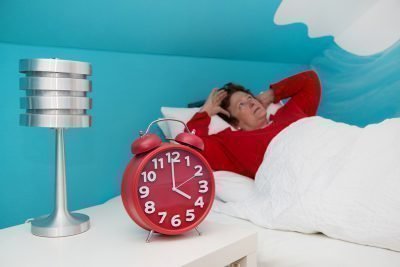
This organ affects a person’s ability to remember information and the emotional state of the patient. It is easy to guess that age-related transformations of the hypothalamus affect the functioning of the most important organs of a woman.
Menopausal neurosis: with vegetative-vascular disorders, symptoms, treatment – Harmony within
- Additional education:
- "Emergency Cardiology"
1990 - Ryazan Medical Institute named after Academician I.P.
Pavlova Contacts
More than 60% of women are susceptible to climacteric neurosis with vegetative-vascular disorders. More often, representatives of the fair sex encounter it when the time of menopause comes. The mood begins to change on its own, and asthenic syndrome occurs.
Vascular dystonia often develops against the background of this disease. But you shouldn’t think that only women suffer from neuroses in combination with VSD. Increased stress at work can also cause seizures in men. Of course, the manifestations of diseases will differ.
Next we will talk about methods of treating neuroses along with VSD.
Depression and VSD: is it normal?
With VSD, neuroses are very common. Almost all people suffering from vegetative-vascular disorders periodically fall into depression and despondency.
In fact, absolutely all people are prone to this emotional state, and it is to some extent normal. This is how the human psyche reacts to nervous overstrain. Insomnia with VSD is one of the symptoms of depression.
In women, the appearance of neurosis with vascular dystonia during menopause is associated with the following reasons:
- Poor nutrition. Sweating with VSD, increased heart rate and other manifestations of the disease may be the result of eating the wrong foods. In such situations, doctors advise limiting the amount of fat and sugar, because... It is these substances that load the blood vessels and heart.
- Smoking. Dry mouth with VSD develops in women due to frequent contact with tobacco smoke. In addition, nicotine has a very strong effect on the lungs and bronchi, so during menopause it is necessary to give up this habit.
- Stress. During menopause, many women become isolated in thoughts of getting old. This leads to the development of depression during VSD. During this difficult time, doctors advise choosing HRT and communicating more with loved ones. As for artificial hormones, they can be taken for the rest of your life without any negative health consequences.
- Lack of physical activity. The reluctance to subject the body to physical activity leads to the fact that all processes in the body begin to proceed more slowly. Stagnation of lymph occurs, hence the appearance of the figure deteriorates and brain function deteriorates.
Only the main factors leading to the development of VSD in menopausal neurosis are listed here. Genetic predisposition to such conditions also plays a role.
Features of the manifestation of VSD in menopausal neurosis
During menopause, it is extremely problematic to diagnose VSD, because their symptoms are similar. Chills during VSD and menopausal neurosis occur with equal frequency.
The difference between the two ailments is that one is influenced by the level of sex hormones, while the other occurs even in healthy people due to the peculiarities of the autonomic system.
When both of these ailments are present, women experience the following symptoms:
- pressure surges;
- unpleasant taste in the mouth;
- constant desire to go to the toilet;
- severe headaches;
- a feeling of fear accompanied by panic or hysteria;
- pain in the heart area.
Coughing with VSD and menopausal neurosis indicates that a person does not receive enough oxygen. The mental state of the patients is most often to blame here.
They set themselves up for negativity, so the heart works faster, the pressure changes abruptly and, in general, a general malaise occurs.
Therefore, many doctors advise contacting doctors who specialize in psychotherapy for VSD.
Methods of psychotherapy used to eliminate VSD
Mental self-regulation has become widespread in vegetative-vascular dystonia. Thanks to her, many patients got rid of hyperhidrosis and other manifestations of this disease. Psychoneurological techniques are most effective when the patient is in a state of neurosis, asthenia or psychoasthenia. There are the following methods to combat attacks of VSD:
- Autotraining. Helps if the patient has cardiophobia.
- Personality psychoanalysis. It is used when a person demonstrates excessive anxiety about the results of his work.
- Art therapy, imagotherapy, personality correction. It is used when the patient demonstrates isolation and reluctance to talk to people, but from time to time they talk about their problems in order to evoke pity.
There are people who do not pay attention to the recommendations of specialists. They refuse to follow recommendations and try not to notice their own problem. In such situations, the doctor must try to reach the patient and his relatives, explain the essence of the disease and the fact that it needs to be treated.
Autotraining for VSD is considered the most effective method if a person has neurocirculatory disorders. Some patients are required to keep health diaries detailing their conditions.
Observing work and rest schedules also helps a lot. Hypnotherapy is also used to treat neuroses and VSD, but the effectiveness of this technique has practically not been proven from a scientific point of view.
Not all patients go into trance easily, and many simply make up memories.
Folk remedies for menopausal neurosis with VSD
Various depressions and mental disorders have been known since ancient times. At the same time, people with vascular dystonia began to appear. You should not think that all diseases are a product of civilization.
Many diseases have existed for centuries. Traditional healers for VSD and neurosis recommend that patients visit the bathhouse more often, take baths with sea salt and try to be more active physically.
Following these recommendations will help patients get rid of excess sweat.
For vascular dystonia and depression, teas with sage, mint, rose hips, and calendula help well. They help calm the nervous system. For a liter of liquid, just add a tablespoon of herb.
Healing baths can be prepared with chamomile, pine or thyme. Do not throw plant leaves directly into an open container. You must first boil 300 grams of the product in boiling water, strain, and pour the mixture into the bath.
The procedure should last no more than 30 minutes.
Source:
Menopause and VSD: vegetative-vascular dystonia in menopausal syndrome
During vegetative menopause, vascular dystonia is one of the most common phenomena. In this situation, pathological changes are directly related to emotional stress. This disease brings most of the unpleasant moments to a woman.
The disease is observed in every fourth person on the planet, and in women during menopause, the predisposition to this disease increases several times. Every woman in adulthood wonders how to recognize the symptoms of this disease, and, importantly, is it possible to prevent the occurrence of this disease?
Symptoms of VSD during menopause
Vegetative-vascular dystonia during menopause in women is often associated with hormonal changes: the female hormone increases sharply, and then also decreases intensively. The occurrence of VSD during premenopause is characterized by certain symptoms, namely:
- Frequent fatigue and poor health;
- Blood pressure surges;
- Development of psycho-emotional disorders in behavior;
- Bitterness occurs in the mouth;
- Severe headaches (migraines);
- Symptoms of excessive sweating are observed.
Cardiopsychoneurosis
NCD is a complex of disorders in the functioning of the cardiovascular system and it occurs as a result of endocrine changes. In medical practice, two types of functional disorders of the body are distinguished: vegetative-vascular and neurocirculatory dystonia.
Neurocirculatory dystonia has significant differences from vegetative-vascular dystonia. Distinctive features of neurocirculatory dystonia, among which there is a predominance of cardiovascular symptoms among all clinical manifestations.
Nervousness during VSD
Nervousness in vegetative-vascular dystonia is one of its characteristic symptoms and it manifests itself in 80% of cases. Nervousness in this disease is caused by several reasons:
- Characteristic circulatory disorders of the central nervous system;
- Against the background of menopause, pathologies arise in the endocrine system;
- Factors that provoked the onset of the disease VSD. These include: stressful situations, intoxication of the body, infectious diseases, abuse of alcohol, nicotine, caffeine, as well as taking illegal drugs.
In addition to all of the above symptoms of nervousness in a patient with VSD, the patient may often be prone to suspiciousness, uncontrolled anxiety attacks or sleep disturbances.
When the disease worsens, the patient may experience subjective complaints: he feels mortally ill, complains of increased heartbeat, as well as pain in the heart area. At the same time, heart activity indicators remain unchanged, within normal limits.
Treatment in this situation is carried out by a general practitioner, and in rare cases by a neurologist, psychologist, and in an advanced stage, a psychiatrist.
Differences between VSD and menopause
Some attacks of VSD have common symptoms with menopause, so it is necessary to have an understanding of these diseases in order to distinguish their features.
During menopause, women experience a surge and decline in hormones. This period occurs when a woman loses her fertility function due to the restructuring of the body. Hormonal levels are disrupted and, as a result, tearfulness, irritability and a rush of blood to the face (throws you into the heat or cold) occurs.
Exacerbation of the disease is not provoked by hormonal disorders, but rather by a hereditary predisposition, which provokes the rapid progression of this disease.
The characteristic symptoms of VSD are attacks of uncontrolled panic, which are in no way related to hormonal disorders, after which problems arise in the functioning of the cardiovascular system.
Menopause and VSD in men
Menopause in men occurs at the age of 49-55 years. By this period, men begin to actively produce the female hormone, and testosterone, on the contrary, reduces its production.
In the normal course of the disease, menopause in the male half of humanity passes without visible changes, except for reproductive function.
In the case of exacerbation, as in women, VSD, psychoneurological disorders, increased tearfulness, depression, absent-mindedness and concentration, as well as sexual disorders are observed.
In this situation, treatment of exacerbations of the disease is carried out by an andrologist - a doctor specialist in this field.
Source: https://mii-info.ru/psihologiya-obshheniya/klimaktericheskij-nevroz-s-vegetososudistymi-narusheniyami-simptomy-lechenie.html
Manifestations of the problem
Common symptoms of menopausal neurosis in women:
- increased sweating;
- dyspnea;
- noise in ears;
- sudden jumps in blood pressure;
- heart pain;
- a feeling of unbearable heat, which is accompanied by redness of the skin;
- increased irritability;
- apathy;
- tearfulness;
- sudden change in mood.
A woman complains of constant fatigue. She may also have trouble sleeping. Many ladies at this time of life are bothered by numbness in their arms and legs. This unpleasant condition develops due to poor circulation.

Menopausal neurosis, manifested by vegetative-vascular pathologies, is eliminated by drugs with phytohormones. The patient may need sedatives.
People around you may notice that the woman’s suspiciousness has increased. During menopause, a woman may exaggerate her ailments, and also perceive with painful attention the signs of aging (gray hair, wrinkles, age spots on the skin). Ladies over 45 often go to extremes regarding their appearance. They come in two types.
- The woman stopped taking care of herself and keeping her clothes tidy.
- The lady resorts to bold methods of rejuvenation (does Botox injections, turns to plastic surgeons for help). Many women dress too brightly and provocatively.
Why does VSD worsen during menopause?
During menopause, involution and gradual cessation of reproductive function occur. This is accompanied by serious hormonal changes. The female body is very sensitive to such changes. Sex hormones not only regulate the activity of the ovaries. They affect the nervous system, metabolism, cardiovascular activity, and blood pressure. Therefore, any hormonal imbalance affects the body as a whole. Because of this, women during menopause often experience symptoms of VSD.

There are several stages of the menopause:
- Premenopause. During this period, ovarian dysfunction is observed, and irregularities in the regularity of the menstrual cycle occur. A woman’s body begins to gradually adapt to such changes.
- Menopause. Your period stops and your last menstrual cycle begins. This usually occurs around age 50.
- Postmenopause. This is the period from the last menstruation to the end of life.
During premenopause, the body gradually gets used to changes in hormone production. The hypothalamus reduces sensitivity to estrogen. However, this is a long process, and at the first stage of adaptation of the body, vegetative disorders are often observed.
Female hormones maintain the tone of the autonomic nervous system. They are responsible for transmitting nerve impulses. When the amount of progesterone and estrogen decreases due to age-related changes, the processes of inhibition and excitation, as well as the conductivity of nerve fibers, are disrupted. This contributes to the emergence or exacerbation of the central type of VSD.
Changes may occur in the nerves leading to the heart. In this case, a cardiac type of VSD appears. When hormonal regulation of vascular tone deteriorates, surges in blood pressure occur.
In addition, as a result of menopausal hormonal imbalance, catecholamines are released - biologically active substances responsible for a person’s emotional background and mood, as well as mental and physical endurance.
Frequent ailments
People far from medicine may think that neurosis during menopause is the usual whims of middle-aged women. This opinion is wrong. Every second woman experiences the painful symptoms of menopausal neurosis to one degree or another.
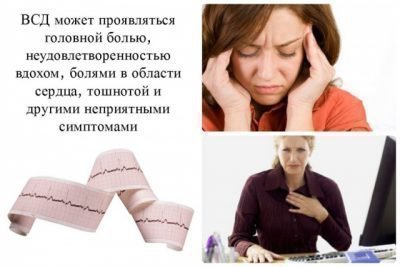
A dangerous relationship arises between the instability of the lady’s emotional state and physical ailments. Deterioration in well-being causes a woman to become hot-tempered and tearful. Too violent emotional reactions become the culprits of tachycardia (rapid heartbeat), shortness of breath and insomnia.
Severe discomfort for women is caused by a decrease in the functions of the vestibular apparatus. How do these changes manifest themselves?
- a woman is sometimes worried about imbalance;
- my head is spinning.
Vascular pathologies are frequent accompaniments of menopause. The heart also has to deal with increased stress.
A cough during menopause indicates that the woman does not have enough oxygen. Emotional instability is to blame for this malaise. The patient is negative, so she worries too much about her appearance and is suspicious of any criticism (even that which is not related to appearance). As a result of frequent worries, healthy hearts begin to work intermittently.
Physical weakness and the inability to get a good night's sleep also negatively affect the woman's general condition. including on her appearance. A woman’s desire to keep herself in good shape disappears. If she previously devoted time to morning exercises every day, during menopause she may give up on herself.

Constant nervous tension can have such dangerous consequences as uterine bleeding and glaucoma.
What is dystonia, the reasons for its occurrence in menopause
Vegetative-vascular dystonia is a whole set of symptoms that arise due to disruptions in the functioning of the nervous and cardiovascular systems. Already one definition may be enough to understand why menopause “pleases” with the first appearance or intensification of illness. After all, during menopause, significant hormonal changes occur, affecting not least the functioning of the central nervous system and brain, the functions and condition of the heart and blood vessels.
A quantitative decrease in estrogens and gestagens provides the conditions for the occurrence of VSD:
- Poor circulation, manifested by bouts of fever and sweating. Failure of thermoregulation is characteristic of a disorder in the functioning of the central nervous system, which cannot but affect the peripheral nerves;
- Periodic failures in the correct heart rhythm, pressure surges. Manifestations negatively affect capillary tone;
- Weakening of blood vessels, the appearance of deposits in them. Cholesterol increases during menopause, and the extensibility of the walls decreases, as does their diameter. This interferes with blood supply to the brain and heart muscle;
- Heightened emotional reactions. A decrease in the production of pleasure hormones leads to the fact that a woman constantly expects bad things and feels insecure in terms of health;
- Metabolic disease. This provokes the appearance of diabetes mellitus, various malfunctions in the functioning of the thyroid gland, that is, diseases that affect both blood vessels and nerves.
The listed symptoms arise due to the fact that the lack of sex hormones makes it impossible to produce many substances necessary for good health. The chemical reactions that support it are disrupted, which affects primarily the nervous and cardiovascular systems. That is, those parts of the body that determine whether vegetative and other signs of the syndrome are present or not.
Additional reasons for exacerbation of VSD in menopause
A disorder of the autonomic system during menopause is also possible due to the lifestyle characteristic of many women who have entered this period:
- Inappropriate nutrition. Excess fat and sugar overloads blood vessels, the heart, and provokes endocrine disorders. The latter can become another factor in the exacerbation of VSD;
- Ignoring the need to move. Blood stagnation increases the oxygen deficiency of brain cells, as well as nerve tissues and the heart, and physically weakens the myocardium and other muscles. This may also include a lack of fresh air. Some consider walking an unnecessary waste of time, which worsens the condition of the meninges;
- Stress. Often, menopause makes you withdraw into yourself and reject help from loved ones, not to mention professional help. Self-isolation aggravates negative emotions, which are the driving force behind panic attacks;
- Smoking. If previously the bad habit did not noticeably affect health, now spasmodic blood vessels and bronchi and lungs clogged with mucus become additional factors in the appearance of a panic attack with angina symptoms and shortness of breath.
Elimination of neurosis
No matter what ailments you may experience during menopause, you should not become discouraged. Seeing a doctor will help avoid worsening neurotic symptoms. Some women are embarrassed to consult a neurologist and ignore painful conditions. As a result, the disease can lead to personality disorders.
You should not turn a blind eye to the existing problem. Modern medicine is armed with effective methods of combating menopausal neurosis. Patients who adhered to the doctor’s recommendations soon noted that their emotional background had stabilized.
Special treatment will help get rid of the signs of neurosis during menopause.

Replenishment of estrogen deficiency. If a woman consults a specialist in the initial stages of a neurotic disorder, the doctor may advise her on homeopathic remedies. Medicines with synthetic estrogens help to achieve positive changes.

- A soothing massage is an excellent way to bring unbalanced emotions into order.
- Antidepressants.
- Sedatives.
- Psychotherapy sessions.
- An important assistant in normalizing a woman’s psychological well-being is physical therapy.
Traditional methods of treatment
In order for menopausal neurosis and its symptoms to become a thing of the past, healing must be comprehensive. It is possible to treat a woman with folk remedies if the illness has appeared recently, but without consulting a doctor, the patient will not be able to determine what the body and nervous system need most.
We will consider in detail proven ways to eliminate neurotic manifestations.
- Dill elixir. You need to take 3 tbsp. l. dill seeds and pour boiling water. The liquid is poured into a thermos, where it is infused for an hour and a half. You need to add a liter of cool water to the resulting infusion. Drink a tablespoon of dill water 3 times a day. The course of treatment lasts a month.
- Tea made from mint leaves. Take a spoonful of fresh or dried plant per liter of boiling water. Oregano infusion: 2 tbsp. l. herbs need to be poured with 200 g of boiling water and left for 5 hours. Drink it three times a day, 10 minutes before meals.
- Healing baths with herbs. Chamomile and thyme are best.
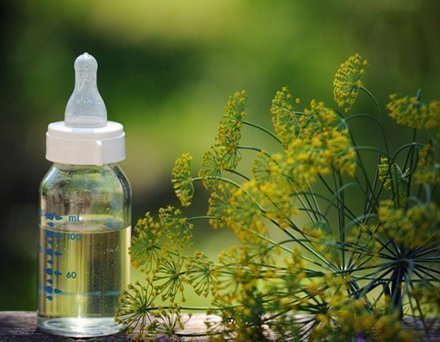
A balanced diet plays an important role in normalizing a woman’s emotional background. Eating fresh vegetables, fruits, nuts, raisins, dried apricots, boiled turkey and beef will help saturate the body with useful substances. Both in youth and in the “autumn season,” women should not give up sea fish and dairy products.
